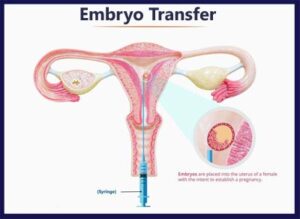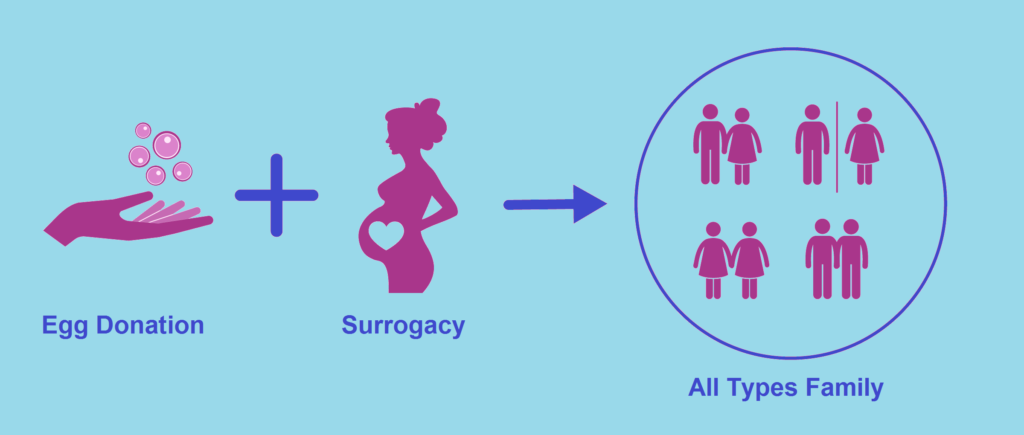Surrogacy via Egg Donation: How to proceed and what challenges you may encounter on your way to parenthood?
Surrogacy via egg donation is often a perfect solution for intended parents who cannot use their eggs for the conception process. This may happen due to random fertility issues with the intended mother. In the coming parts of this blog, we will talk about how to go through surrogacy via egg donation in a step-by-step procedure.
Know about Surrogacy via Egg Donation
- Deciding on Surrogacy via Egg Donation
The journey typically kicks starts when intended parents decide to pursue surrogacy with the help of an egg donor. Moreover, there are many reasons why a woman might use an egg donor, such as age-related infertility, genetic disorders, or a lack of quality eggs.
- Finding an egg donor
The intended parents, often with the assistance of a surrogacy agency or fertility clinic, find an egg donor. That said, donors are usually young, healthy women who undergo thorough medical and psychological screening. Besides, the selection may involve considering physical traits, health history, educational background, and other factors to find a suitable match.
- Legal Agreements
Once the egg donor is finalized, legal agreements are drawn up to outline the rights and responsibilities of all parties involved—the intended parents, the egg donor, and a surrogate mother in the USA. Moreover, these agreements address issues like compensation, confidentiality, and parental rights, ensuring everyone’s interests are protected.
- Egg Retrieval
Before the egg donor’s eggs can be used, she goes through a process called egg retrieval. That said, this is a minor surgical procedure typically done under anesthesia. Moreover, a doctor uses a thin needle to collect eggs from the donor’s ovaries. Besides, the eggs are then taken to a laboratory for fertilization.
- Fertilization
The intended father’s sperm or donor sperm is used to fertilize the retrieved eggs in the laboratory through in vitro fertilization (IVF). Moreover, this process leads to the creation of the embryos.
- Embryo Selection and Quality
We should know that not all embryos are the same. That said, some may be healthier or more likely to result in a successful pregnancy than others. Besides, embryo selection is a crucial step, and fertility experts carefully examine the embryos for quality. Moreover, only the best-quality embryos are chosen for the surrogacy journey.
- Preparing the Surrogate
While the embryos are developing, the surrogate mother undergoes medical evaluations and procedures to ensure she is physically ready to carry a pregnancy. Besides, hormone medications are often given to synchronize her menstrual cycle with the embryo transfer process.
- Embryo Transfer

- Pregnancy and Support
After the embryo transfer, the surrogate enters the pregnancy phase. There, she receives proper medical care and support to ensure a healthy pregnancy. Moreover, regular check-ups and prenatal care are essential during this phase.
- Birth and Legal Procedures
When the baby is born, the legal procedures put in place earlier are followed to establish the parental rights of the intended parents. Also, in many cases, the surrogate has no legal rights or responsibilities towards the child, and the intended parents become the legal parents from the moment of birth. That said, your surrogacy agency has a big role to play here.
- Bringing Baby Home
Once the legal matters are settled, the intended parents can bring their baby home and start their journey as a family. Hence, we can say that surrogacy via egg donation is a great option that allows individuals and couples facing infertility challenges to fulfil their dream of parenthood. Still, It involves careful planning, medical procedures, legal agreements, and emotional support for all parties involved. Besides, through the collaboration of egg donors, surrogates, and fertility experts, many families have found a way to celebrate the joy of parenthood. Also, it’s a beautiful example of how science and compassion can come together to create families and make dreams come true.
Key challenges that may come your way during Surrogacy via egg donation
Whereas this way to parenthood brings utmost joy and happiness, it comes with its set of challenges.
- Emotional and Mental Challenges
Surrogacy via egg donation can be an emotionally charged journey. This is where intended parents may deal with sentiments of sadness and misfortune, as they are not utilizing the intended mother’s eggs. Moreover, they may also experience stress, vulnerability, and the pressure of financial implications. On the other hand, egg donors and surrogates may confront emotional challenges related to giving a portion of them to assist others, as well as potential concerns about the physical and emotional toll of the method.
- Legal Complexities
Exploring the legal angles of surrogacy and egg donation can be complex. That said, laws with respect to surrogacy and egg donation change broadly by nation and indeed inside distinctive states or regions. This is where legal agreements must be carefully drafted to ensure the rights and obligations of all parties, including parental rights and money-related agreements. Also, legal challenges can arise if these understandings are not well-defined or if the laws change during the method.
- Surrogacy Costs
Surrogacy through egg donation can be costly. That said, costs include egg donor costs, surrogate costs, medical costs, fertility clinic expenses, legal expenses, and more. This is where intended parents regularly have to be careful while planning a budget for these costs. This may include significant financial costs and one should be prepared for this. Moreover, it’s significant to have a clear understanding of the costs included and to be ready in this aspect.
- Finding the right match
Selecting the right egg donor and surrogate can be challenging. This is where intended parents must find an egg donor whose qualities adjust with their expectations. Besides, they must look for surrogates who are physically and mentally ready for the journey. Also, this coordinating process can take time, and there may be vulnerabilities along the way.
- Medical Complications
Medical challenges can emerge at different stages of surrogacy by means of the egg donation process. That said, egg retrieval can have risks and complications for the donor, and the surrogate may experience complications amid pregnancy. Besides, these medical challenges can include stress and uneasiness for the surrogate and the intended parents.
- Moral and Ethical aspects
Surrogacy and egg donation raise moral and ethical questions for a few people and communities. That said, concerns about commodification, misuse, or the rights of the child may emerge. Besides, these moral contemplations can include complexity in the decision-making process for those included.
- Communication and Desires
Viable communication between all parties—intended parents, egg donors, and surrogates—is vital for an effective surrogacy journey. Moreover, random misunderstandings or neglected desires can lead to pressure and struggle for everyone involved. Besides, open and fair communication is fundamental to constructing belief and keeping up a positive relationship.
- Emotional support
Emotional support is imperative all through the surrogacy process. That said, intended parents, egg donors, and surrogates may benefit from counselling or treatment to address the emotional challenges they encounter. Also, support groups and resources can give a sense of community and understanding.
- Random health risks
There are several undeniable health risks for both egg donors and surrogates in this process. That said, egg donation requires hormone medications and a surgical strategy, which may carry potential risks. On the other hand, surrogates confront health risks amid pregnancy, including complications that can influence their overall well-being. This is where guaranteeing the well-being and safety of all parties included may be a vital concern.
- Changing Circumstances
Life is uncertain, and changing circumstances can impact the surrogacy process. Moreover, surrogates may experience individual challenges that influence their capacity to go ahead with the journey. Also, intended parents may confront startling life situations that disturb their plans. This is where adaptability and careful planning are fundamental.
Final words
Surrogacy via egg donation could be a complex process for many. Moreover, it may come along with a list of challenges listed above. That said, overcoming these challenges requires careful planning, open communication, emotional support and a commitment to the shared objective of bringing a child into the world. Also, in spite of the challenges, numerous families have effectively explored the path of surrogacy via egg donation, celebrating the bliss of parenthood and the surprising blessing of life. Moreover, it may be a confirmation of the flexibility and assurance of those who set out on this extraordinary journey.




